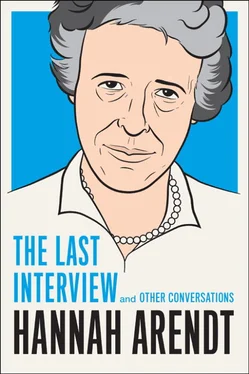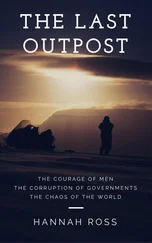GAUS:You must leave the question of what is legitimate open to discussion.
ARENDT:Yes, that is true. You are right. The question of what is legitimate is still open to discussion. I probably mean by “legitimate” something different from what the Jewish organizations mean. But let us assume that real interests, which even I recognize, were at stake.
GAUS:Might one then be silent about the truth?
ARENDT:Might I have been? Yes! To be sure, I might have written it… But look here, someone asked me, if I had anticipated one thing or another, wouldn’t I have written the Eichmann book differently? I answered: No. I would have confronted the alternative: to write or not to write. Because one can also hold one’s tongue.
GAUS:Yes.
ARENDT:One doesn’t always have to speak. But now we come to the question of what, in the eighteenth century, were called “truths of fact.” This is really a matter of truths of fact. It is not a matter of opinions. The historical sciences in the universities are the guardians of truths of fact.
GAUS:They have not always been the best ones.
ARENDT:No. They collapse. They are controlled by the state. I have been told that a historian remarked of some book about the origin of the First World War: “I won’t let this spoil the memory of such an uplifting time!” That is a man who does not know who he is. But that is uninteresting. De facto he is the guardian of historical truth, the truth of facts. And we know how important these guardians are from Bolshevik history, for example, where history is rewritten every five years and the facts remain unknown: for instance, that there was a Mr. Trotsky. Is this what we want? Is that what governments are interested in?
GAUS:They might have that interest. But do they have that right?
ARENDT:Do they have that right? They do not appear to believe it themselves—otherwise they would not tolerate universities at all. Thus, even states are interested in the truth. I don’t mean military secrets; that’s something else. But these events go back approximately twenty years. Why shouldn’t one speak the truth?
GAUS:Perhaps because twenty years are still too little?
ARENDT:Many people say that; others say that after twenty years one can no longer figure out the truth. In any case, there is an interest in whitewashing. That, however, is not a legitimate interest.
GAUS:In case of doubt, you would prefer the truth.
ARENDT:I would rather say that impartiality—which came into the world when Homer…
GAUS:For the conquered as well…
ARENDT:Right!
Wenn des Liedes Stimmen schweigen
Von dem überwundnen Mann,
So will ich für Hectorn zeugen…
[If the voices of song are silent
For him who has been vanquished,
I myself will testify for Hector…] [e] From Schiller’s Das Siegesfest.
Isn’t that right? That’s what Homer did. Then came Herodotus, who spoke of “the great deeds of the Greeks and the barbarians.” All of science comes from this spirit, even modern science, and the science of history too. If someone is not capable of this impartiality because he pretends to love his people so much that he pays flattering homage to them all the time—well, then there’s nothing to be done. I do not believe that people like that are patriots.
GAUS:In one of your most important works, The Human Condition , you come to the conclusion, Miss Arendt, that the modern period has dethroned the sense of what concerns everyone, that is, the sense of the prime importance of the political. You designate as modern social phenomena the uprooting and loneliness of the masses and the triumph of a type of human being who finds satisfaction in the process of mere labor and consumption. I have two questions about this. First, to what extent is this kind of philosophical knowledge dependent upon a personal experience which first gets the process of thinking going?
ARENDT:I do not believe that there is any thought process possible without personal experience. Every thought is an afterthought, that is, a reflection on some matter or event. Isn’t that so? I live in the modern world, and obviously my experience is in and of the modern world. This, after all, is not controversial. But the matter of merely laboring and consuming is of crucial importance for the reason that a kind of worldlessness defines itself there too. Nobody cares any longer what the world looks like.
GAUS:“World” understood always as the space in which politics can originate.
ARENDT:I comprehend it now in a much larger sense, as the space in which things become public, as the space in which one lives and which must look presentable. In which art appears, of course. In which all kinds of things appear. You remember that Kennedy tried to expand the public space quite decisively by inviting poets and other ne’er-do-wells to the White House. So that it all could belong to this space. However, in labor and consumption man is utterly thrown back on himself.
GAUS:On the biological.
ARENDT:On the biological, and on himself. And there you have the connection with loneliness. A peculiar loneliness arises in the process of labor. I cannot go into that right now, because it would lead us too far afield. But this loneliness consists in being thrown back upon oneself; a state of affairs in which, so to speak, consumption takes the place of all the truly relating activities.
GAUS:A second question in this connection: In The Human Condition you come to the conclusion that “truly world-oriented experiences”—you mean insights and experiences of the highest political significance—“withdraw more and more from the experiential horizon of the average human life.” You say that today “the ability to act is restricted to a few people.” What does this mean in terms of practical politics, Miss Arendt? To what extent does a form of government based, at least theoretically, on the cooperative responsibility of all citizens become a fiction under these circumstances?
ARENDT:I want to qualify that a bit. Look, this inability to be realistically oriented applies not only to the masses, but also to every other stratum of society. I would say even to the statesman. The statesman is surrounded, encircled by an army of experts. So that now the question of action lies between the statesman and the experts. The statesman has to make the final decision. He can hardly do that realistically, since he can’t know everything himself. He must take the advice of experts, indeed of experts who in principle always have to contradict each other. Isn’t that so? Every reasonable statesman summons experts with opposing points of view. Because he has to see the matter from all sides. That’s true, isn’t it? He has to judge between them. And this judging is a highly mysterious process—in which, then, common sense [f] By “common sense” ( Gemeinsinn ), Arendt does not mean the unreflective prudence that every sane adult exercises continuously ( gesunder Menschenverstand ), but, rather, as Kant put it, “a sense common to all … a faculty of judgment which, in its reflection, takes account… of the mode of representation of all other men,” Immanuel Kant, Critique of Judgment , §40, cited in Arendt’s Lectures on Kant’s Political Philosophy , ed. R. Beiner (Chicago: University of Chicago Press, 1982), 70–72.
is made manifest. As far as the masses are concerned, I would say the following: Wherever men come together, in whatever numbers, public interests come into play.
Читать дальше












